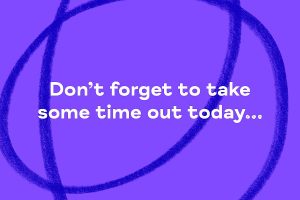Taking care of yourself
Not all practices are suitable for everyone. If any of the practices make you feel worse in any way – either more anxious, or dizzy, or upset, then please stop. It may not be the right practice for you, or just not the right time to be doing it. If you find yourself feeling worse, then the guidance is to firstly ground yourself in whatever way helps – perhaps connecting to the physical sensations of where your body meets the seat/bed/floor or to notice some objects around you, perhaps listing them in your head. All of these practices can be listened to online from this web page, or downloaded to your device. Do get in touch if you have any questions or feedback: Contact us
Breath and calming practices
For many people, the quickest route to calming down is to slow and deepen the breath. Most of us breathe at a relatively fast rate, and it’s often quite shallow in the body as well. This can add to our stress or anxiety without us even realising it. Breath control techniques allow us to take control of the breath, slow and deepen it, which can help dial down the body’s stress response. It’s a good idea to practice this when you’re not anxious so that it’s more available for you when you need it. If any of the breathing practices make you feel dizzy, then you may need to work up to them. Some very shallow breathers find it can make them feel a bit dizzy or anxious to change the breath in this way, but don’t be disheartened. It might be that you need to just take it slowly, trying a few breaths first of all, and building up to more when you’re ready. However, if you find the breath just doesn’t work for you as a calming technique, or you already know that you don’t like to focus on the breath, don’t worry as there are plenty of alternatives. The check-in, feet, seat, hands, FOCBOC, and senses/grounding practices are good places to start. You can listen to the recordings on this webpage, or download them and listen to them offload on your device. Contact us with any feedback, questions or suggestions of other practices you’d like to see here.
Short calming and grounding practices
Belly Breathing
Learning to gently calm and deepen the breath
Breath Control practice
Adjusting the lengths of the breath to help calm the mind and body
Check In Practice
A way to take a pause in the day and to check in with how we are feeling
Morning pause
A short morning pause
Grounding practice
Using our senses to ground and calm body and mind
Pre-breakfast pause
Taking a pause before breakfast can mean we can eat more mindfully
Sounds Meditation
Using our sense of hearing to ground and calm
Feet, seat, hands
When we focus on the tangible sensations of our feet, seat and hands, it can help ground and calm ourselves in the midst of a busy day
Choose your Anchor practice
An anchor is something we focus our attention on, and something that we can bring our attention back to when our minds wander (as minds tend to do). This practice invites you to try out three different anchors to see which you prefer.
Yoga nidra
A yoga nidra is a deep relaxation practice. I think it’s like a greatest hits of meditation/relaxation. We do a body scan, focuses on the breath for a bit, and there’s some visualisation as well. While the aim is to stay awake, this is a state of consciousness in between waking and sleeping. It’s sometimes known as yogic sleep (though we are awake) and can help with stress and anxiety, and deep relaxation. It’s a good practice to do when you need to relax, or even when you can’t sleep, as it’s restful for both the mind and body. We have two versions available. A 20 minute, and a longer 30 minute version. There’s also an introduction which is worth listening to before you do either practice for the first time.
Yoga nidra introduction
Listen to this before you do the practice for the first time
Yoga nidra - long practice
A 30 minute deep relaxation
Yoga nidra short practice
A 20 minute deep relaxation
Visualisations
Lots of people find that visualisations are a great way to calm down. We can go to a relaxing place in our mind, allowing us to let go and relax. We’ve included three visualisations from our Building a Healthy Future course here, and the mountain meditation.
Landscape visualisation
Using our imagination to take us to a relaxation landscape
Mountain meditation
Using the image of a mountain to help us build resilience and strength
A trip to the beach
Using our imagination to take a trip to the beach
Colour meditation
Using colour to help us relax and ease pain
Before bed
It can be hard to sleep if the body is tense and the mind is very busy. We have a couple of pre-bed practices here, as well as a middle of the night rescue practice for when you wake in the night and find it hard to sleep. Belly breathing can also be good to do before you settle into sleep.
Bedtime Body Scan
A relaxing bedtime body scan - to be done in bed before sleep!
Progressive Muscle Relaxation
Tensing and releasing the muscles before we sleep can help the mind and body let go
Middle of the night rescue
For middle of the night waking
First thing in the morning
We can often start our days in stress mode without even realising it. These two practices invite you to awaken the body and become more present before you start all the rushing about. You can even do these practices in bed before you get up. We’re awakening ourselves to our senses, our bodily sensations and setting a positive intention for our day. Rather than having a ‘to do’ list, we invite you to think about how you want to BE in the day ahead instead.
Short morning practice
Using senses and awareness, start the day in a positive, more relaxed way
Longer morning practice
For when you have more time, start your day by becoming alive to your body, your senses and begin to settle the mind

